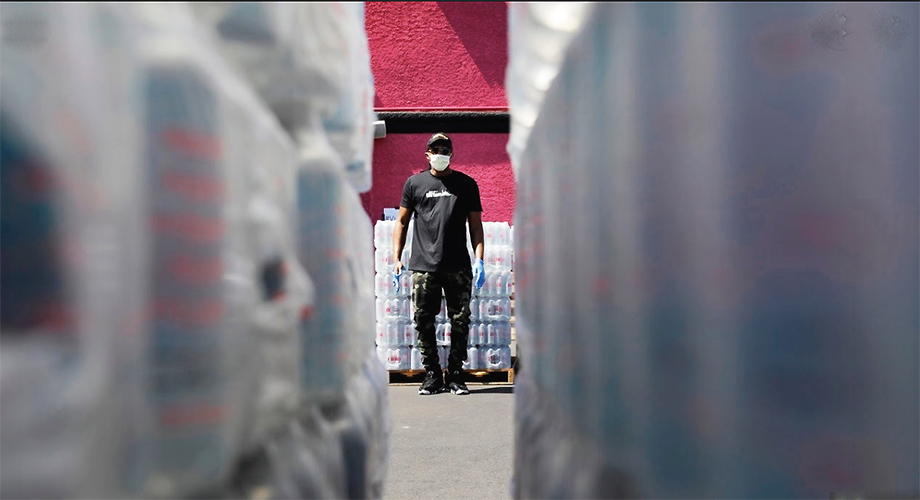By Eric Smith
<span style="color: #a1a1a1;">This latest installment of our occasional Coronavirus Notebook begins with a deeper look into the so-called “winners” that have emerged during the current crisis.
While it’s difficult to claim any true victors as the COVID-19 pandemic claims lives, closes businesses and causes massive layoffs, certain product categories have seen demand soar—especially those that fall under some form of emergency preparedness.
Last week, SGB Executive shined a spotlight on Salt Lake City, UT-based portable power brand Goal Zero, which has seen significant increase in sales due to the coronavirus. “We’ve never had such a good month in our history,” said GM Bill Harmon. “Our call center cannot keep up with the influx of calls that are coming in. It just highlights how different things can be depending on what your product or service is.”
Other categories to benefit include at-home fitness companies (like Peloton) and ammunition and firearms makers, which were outlined in the March 18 Notebook. Each of those segments has tapped into COVID-related phenomena—people are not able to go to a gym and perhaps won’t want to even when they reopen, while others are fearful of the pandemic escalating to the point where they need to protect themselves.
According to KeyBanc Capital Markets, which published a note to investors titled “Stock Ideas to Consider Now,” there are winners that fall outside the “prepping” category. The analysts who compiled the note called out a pair of active-lifestyle companies that also stand to benefit—Callaway Golf Co. and Lululemon Athletica Inc.
Of Callaway, the analysts wrote that they “expect golf (as both a sport and as an industry) to continue to benefit as consumers are unable to participate in most indoor-based/large crowd activities (movie theaters, sporting events, etc.); we note that as of March 27 an estimated 74 percent of in-season U.S. golf courses were open and google search trends for golf courses continues to rise.” (Look for more analysis on the golf industry later this week.)
And of Lululemon, they wrote that the company is “well-positioned from a near- and long-term secular perspective. Pricing integrity is a key component of the brand, and we think the brand will be successful in managing near-term excess inventory.”
Another brand that is “winning” during this crisis is LifeStraw, which makes a variety of water filtration and purification products for individuals, homes and communities. As SGB Executive has reported in recent days and weeks, companies that focus on access to power, food and water when infrastructures are jeopardized—even if that’s only a perception—have seen their products fly off shelves via direct channels or the sporting goods retailers that are still open.
“We’ve seen quite a large spike in demand,” said Tara Lundy, head of brand, LifeStraw. “We’ve been focused on just trying to maintain inventory levels to meet customer needs. For the most part in the outdoor industry, this is a little bit of a low season where you’re starting to ramp up to spring/summer, but our products have always been utilized in emergency situations. I think that as people are augmenting their emergency kit, a lot of them have turned to LifeStraw.”
Of course, most of LifeStraw’s channel partners closed their brick & mortar locations in recent weeks but kept their e-commerce offerings intact. LifeStraw’s own DTC channel has been booming too, Lundy said.
“We have seen quite a significant increase in our direct lifestraw.com business,” she said. “Our online retailers and even our brick & mortar retailers like REI are also seeing increased demand, so it’s mostly across the board. But we’ve seen a significant increase in our direct business, for sure.”
The coronavirus crisis creates challenges, of course, even for brands whose products are in high demand. Maintaining a supply chain’s integrity has been a pain point for many. LifeStraw, for example, has seen shipping prices escalate, not to mention ongoing struggles with booking containers departing Asia. The company has resorted to shipping some products via air freight, which has driven up prices.
“We’re doing the best we can, given the circumstances, but we’re seeing increased costs on that end,” Lundy said.
Regardless of supply chain and other challenges, LifeStraw hasn’t stopped delivering product to customers via available channels, nor has it wavered on efforts to remove single-use plastic and to promote clean water availability around the world as panic further takes hold in numerous regions.
“We’re happy that we been able to fill a need during the time,” Lundy said. “It hits home and we want to be supportive of our communities. For a long time, we’ve tried to make long-lasting products that help offset demand for single-use plastic. We’ve benefited from having awareness of that for a long time, and now we’re facing a situation where a lot of people see the need.”
As the coronavirus rolls on, look for more coverage on brands thriving during this crisis.
…
Recent Coronavirus Coverage
Last week, SGB Executive’s writers began an occasional series of interviews with active-lifestyle CEOs. The first was Adam Blumenfeld of Varsity Brands, who dished on how the COVID-19 has impacted Varsity Brands, the company’s recovery strategy and how calls for social distancing may be changing consumer behavior.
Next came Jon Barker of Sportsman’s Warehouse, who talked about high-demand product categories like firearms and ammunition, water filtration, first aid, fuel, freeze-dried food and portable power.
Other coverage of the week included how the coronavirus resulted in the expected cancellation of Outdoor Retailer Summer Market, the outdoor industry’s largest, signature event. The loss of OR could lead to some sweeping changes in the trade show world, which will be covered here soon.
Looking more broadly, we examined the $2 trillion stimulus package, dubbed the Coronavirus Aid, Relief and Economic Security (CARES) Act, breaking down the funding components.
We also looked at the impact the coronavirus is having on specific categories. For example, the snow sports specialty channel is facing dire times during what should be one of their busiest times of the year. but there’s no playbook for navigating this uncharted, unprecedented crisis.
And our deep-dive on a survey of more than 100 run specialty stores across the U.S. from the Running Industry Association (RIA) paints a bleak picture of how independents are weathering the COVID-19 pandemic.
Not surprisingly, Nike Inc. has emerged as one of the craftiest companies when it comes to coping with the coronavirus. In addition to outlining the company’s e-commerce strategy, we dissect the “playbook” that Nike has deployed and which CEO John Donahoe said has guided the company through this mess.
Here are some other SGB Executive stories from the past week that show how companies and associations are navigating the coronavirus (click the headline to read):
- Under Armour Faces Downgrades On Expected Coronavirus Hit
- Sportsman’s Warehouse On A Roll, But Uncertainty Brewing
- Lululemon Identifies Five Levers To Combat Coronavirus
- Coronavirus Slams The Brakes On Winnebago’s Momentum
- Shoe Carnival’s Q4 Earnings More Than Double
SGB Executive wants to hear from you, our readers. Drop us an email at sgbmedia@sgbonline.com to suggest an active-lifestyle executive to interview, a story angle related to the coronavirus or to let us know how things are going for your brand or retail store during this unprecedented time in our nation’s history. Photo courtesy Sky News Australia
















